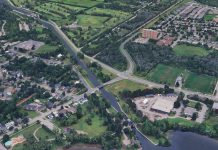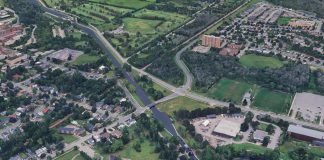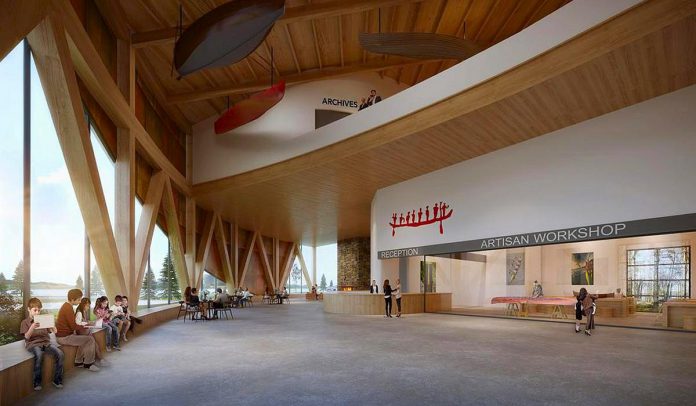
Plan B typically gets a bad rap — the inference being that it’s inferior to Plan A in scope and ambition, and therefore falls short of what was originally intended.
When an independent investigation undertaken in May 2020 revealed the original proposed site of the new Canadian Canoe Museum beside the Peterborough Lift Lock is contaminated with various chemicals including the carcinogen trichloroethylene (TCE), museum officials terminated a land lease agreement with Parks Canada in October. With Plan A scuttled, attention turned to Plan B.
On Wednesday night (April 28) via a virtual public meeting, an update was provided on the museum’s plans for its new home at 2077 Ashburnham Drive (the Johnson property) near Beavermead Park. What became quite clear is that, while the location has changed, all of the building features initially envisioned and planned for remain in place.
As it turns out, Plan B is not all that different from Plan A and that alone has all involved with the project very excited.
“Sometimes there’s a bigger plan for us and we end up in places where we didn’t know we would end up,” said museum board chair Victoria Grant, admitting the discovery of contaminants on the original site “was a big shock to all of us.”
“But there was never a time when we said there isn’t going to be a (new) canoe museum. Once we made that decision (to end the land lease with Parks Canada), the canoes still needed a home.”
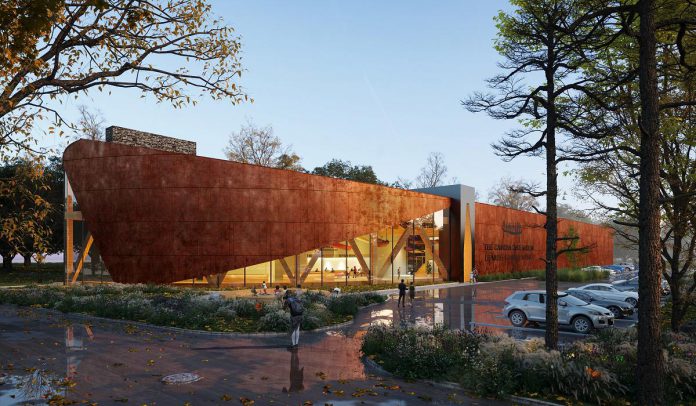
Museum executive director Carolyn Hyslop said the search for an alternative site location began almost immediately with the end of the lease.
“We were guided through that process by the museum’s values and our project goals, which are ultimately to create a new home for 100 per cent of this collection that we care for in a safe and accessible building,” she said. “We needed to make sure we are on the water so that we can offer more on-water canoeing and kayaking programs. We also wanted a site that could be developed in the schedule that we needed.”
“And we also needed a site that could meet our budget, and that we could develop on the property in such a way that addresses the new realities we are all living with as we’re going through this pandemic. We have landed at a beautiful property that does all of this.”
Of note in relation to what transpired at the original Parks Canada location, environmental geologist Thomas Grace (of Lindsay-based Thomas Grace and Associates) confirmed an initial phase of environmental site assessment work at the new location has shown “absolutely no indication of contamination.”
With construction of the new museum scheduled to begin this fall with the opening targeted for the summer of 2023, Hyslop says the total project cost remains in the range of $35 to $40 million with about 90 per cent of that in hand, including $2 million raised just over the past two months.
Earlier commitments to the project include $9 million from the Ontario government, $1.4 million from the federal government, and $7.5 million from the W. Garfield Weston Foundation — the largest ever one-time private gift to a local charitable organization.
Back in January, Peterborough city council gave its approval for the $1.575 million sale of the five-acre Johnson property to proceed subject to a number of conditions, including rezoning, project validation, and confirmation of site appropriateness. Wednesday’s public meeting met one of the required conditions of the approval process.
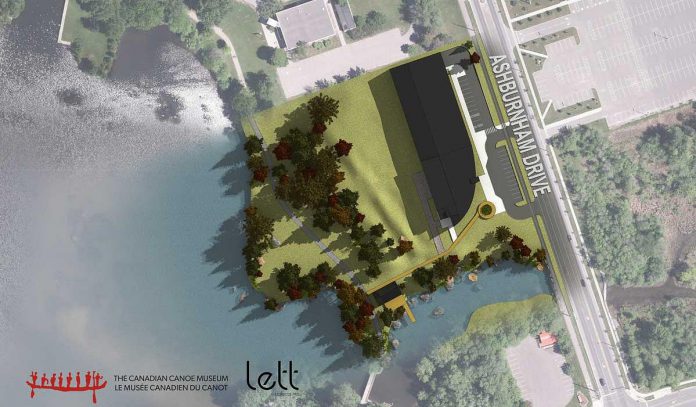
As for the design and construction of the new museum, Lett Architects Inc. of Peterborough is working in collaboration with a number of partners, a number of them local. Managing principal Bill Lett explained an “integrated project delivery” approach has been adopted.
“In a typical project, we start by developing what we are going to design and build, and typically that only involves the owner and the architect,” Lett said. “Later on we look at the how and the who, adding players as we go. Things are very different in this process.”
“We talk about what we’re going to build, how we’re going to build it, and who is going to build it from the very beginning of the project. We have all the stakeholders on board right from the start. That makes this type of approach fundamentally different than a typical approach that we might take. The early engagement of trade partners, designers, owners, and contractors provides the opportunity for a much deeper level of collaboration.”
Saying the building and property is being designed with the visitor experience front of mind, Lett says the goal is “to enhance what is currently great about this site,” noting connectivity to the existing Great Trail of Canada which traverses the property near the shore of Little Lake.
Hyslop added a key focus of the project “is to have as little impact environmentally as possible.”
“Working with our project partners, we want to develop a master plan that focuses on rehabilitation and restoration of the natural world that exists there,” she said, adding “We have this wonderful opportunity to actually enhance the site through our ownership and through the stewardship activities that we want to put in place.”
“We want to restabilize the shore — restore the shore — with plantings and other mechanisms so that it’s much more intact than what it is now.”
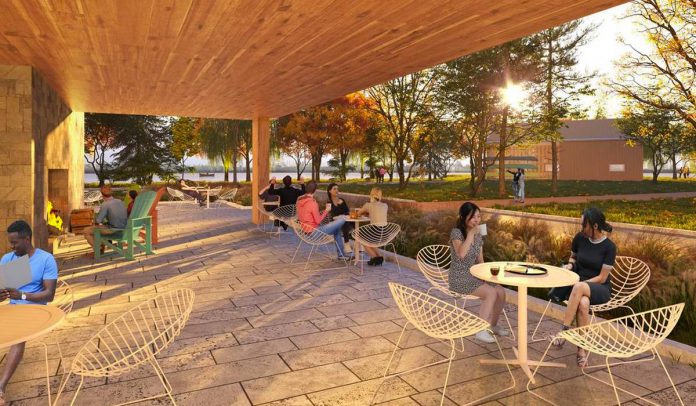
As for the 65,000-square-foot building’s design, Lett said it’s “inspired by the (canoe) collection and the museum’s values. This building speaks about craft, construction and user experience.”
Major components of the building include a large naturally lit lobby and atrium, an environmentally controlled storage space encompassing the highest artifact conservation standards that will house the hundreds of canoes in the museum’s possession but not on display, and, of course, the exhibit galleries.
“When you walk into this place, authentic experience — not contrived — is really front and foremost,” said museum curator Jeremy Ward, noting the work of canoe restoration and building will be very visible for visitors.
The 17,000-square-foot exhibit space, notes Ward, will feature seven exhibit “zones” tentatively titled as follows:
- Headwaters — a central gathering space.
- All My Relations — a celebration of the canoe in all its forms.
- Connected By Canoe — an overview of how the canoe has connected people and their communities.
- Design, Ingenuity and The Maker — “deconstruction” of the canoe “to get deeper meanings from it”.
- Pushing The Limits — an exploration of how paddled watercraft have pushed people to do “incredible” things”.
- Inspiration — an examination of canoeing as a transformative experience.
- Temporary Exhibit Zone — a space that will be renewed on a yearly basis, with the first planned exhibit detailing the story of the Canadian Canoe Museum from its inception to the present.
“Another important theme you’ll encounter here is water,” added Ward. “The energy of water as it flows to the sea is going to carry you through the entire exhibit experience.”
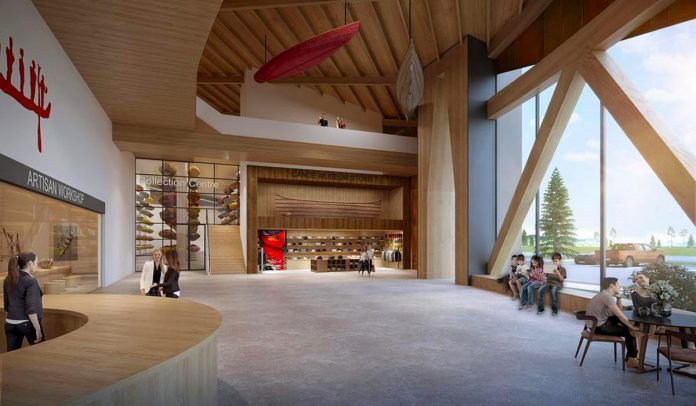
With the concept design and validation process set to be completed by June, planning and design of the museum and property will begin in earnest in July and carry on until October when shovels are expected to go to work on site.
It’s expected the required rezoning for the property will be in place come the end of July, following city council review and approval.
For more information about the new museum or to make a donation to the Inspiring Canada By Canoe Campaign, visit canoemuseum.ca or email info@canoemuseum.ca.
Questions related to the property’s rezoning can be sent to Peterborough development planning supervisor Brad Appleby at bappleby@peterborough.ca.


